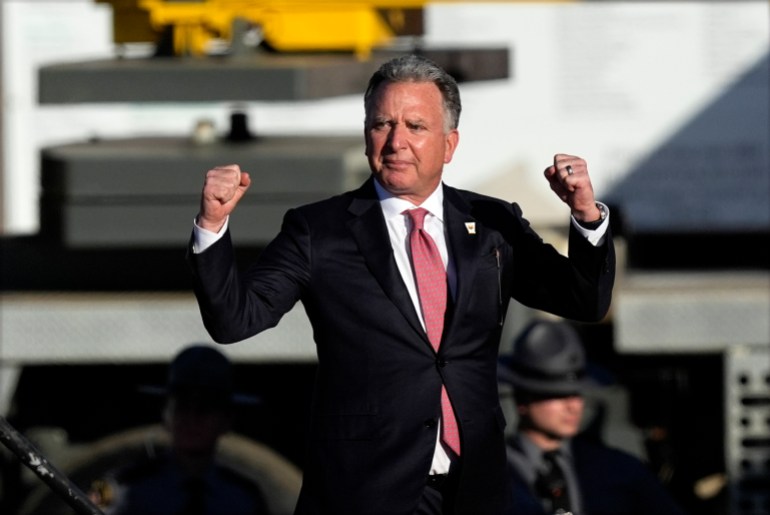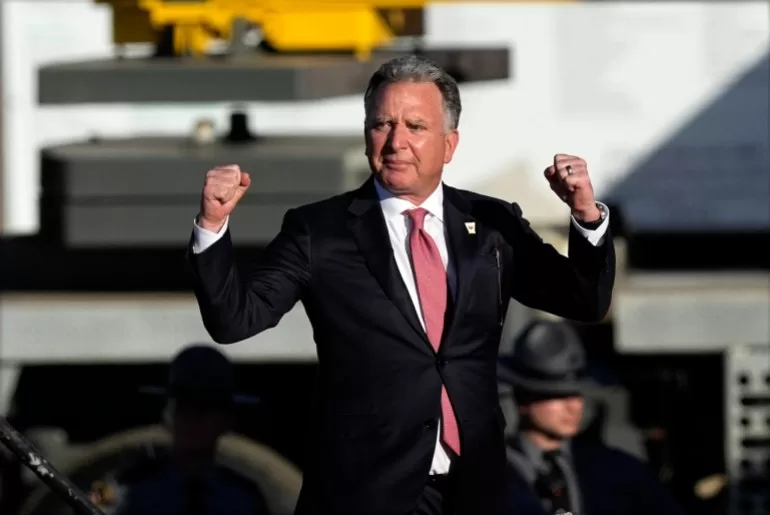President-elect Donald Trump has nominated former Arkansas governor Mike Huckabee to the post of United States ambassador to Israel and has appointed his regular golf partner, businessman Steven Witkoff, to be a special envoy to the Middle East.
The back-to-back announcements have begun to give shape to Trump’s approach to the region, where he has vowed to maintain staunch support for Israel while swiftly ending the wars in Gaza and Lebanon. The president-elect is also expected to bolster a series of diplomatic normalisations reached during his first term between Israel and several Arab countries, known as the Abraham Accords.
“I am pleased to announce that the Highly Respected former Governor of Arkansas, Mike Huckabee, has been nominated to be The United States Ambassador to Israel…”, Trump wrote via his TruthSocial platform on Tuesday.
“Mike has been a great public servant, Governor, and Leader in Fatih for many years. He loves Israel, and the people of Israel, and likewise, the people of Israel love him”, a statement attached to Trump’s TruthSocial post read. “Mike will work tirelessly to bring about Peace in the Middle East!”
In a subsequent post Trump described Witkoff – a real estate tycoon who was present when Trump faced a second assassination attempt while golfing in Florida in September – as a “highly respected leader in business and philanthropy, who has made every project and community he has been involved with stronger and more prosperous”.
“Steve will be an unrelenting voice for PEACE, and make us all proud,” Trump wrote.
Ambassador to Israel
Huckabee is not new to Trump’s orbit.
After serving as the governor of Arkansas from 1996 to 2007, he made unsuccessful bids to be the Republican presidential candidate during the 2008 and 2016 primary season. In the latter cycle, Huckabee faced a then longshot candidate Trump, who went on to win the nomination and later the presidency.
His daughter, current Arkansas Governor Sarah Huckabee-Sanders, also served as Trump’s press secretary for part of his first term as president, from 2017 to 2019.
Huckabee is noted for his Evangelical Christian faith, which he ties closely to his policies and beliefs on Israel, declaring on several occasions that the occupied West Bank is biblically part of Israeli territory.
“There are certain words I refuse to use. There is no such thing as a West Bank. It’s Judea and Samaria. There’s no such thing as a settlement. They’re communities, they’re neighbourhoods, they’re cities. There’s no such thing as an occupation,” he said on CNN in 2017.
In 2015, during his run for president, Huckabee attended a fundraiser for American citizens in the Israeli settlement of Shiloh, describing the West Bank, which he again referred to as “Judea and Samaria”, the territory’s biblical name – as a fundamental part of Israel.
Israeli settlements in the occupied West Bank are illegal under international law.
Special envoy to the Middle East
Far less is known about Witkoff’s policy positions when it comes to the Middle East. The 67-year-old – who has also been tapped to lead Trump’s inaugural committee – has no formal diplomatic or foreign policy experience.
A statement announcing his appointment – which unlike Huckabee’s is not set to require Senate confirmation – instead pointed to Witkoff’s business bonafides.
The tycoon has “leveraged his extensive real estate expertise to successfully lead the financing, repositioning and construction of over 70 properties in major business districts in the US as well as abroad, with offices in New York, Los Angeles, and Miami”, the statement said.
It also hailed Witkoff’s role on the executive committee for the Real Estate Board of New York and positions on the boards of several New York foundations, as well as two universities.

The pick is largely in line with Trump’s preference to appoint close allies in key roles related to the region.
In his first term, Trump appointed his former corporate lawyer, Jason Greenbaltt, as his special representative for international negotiations. He also relied heavily on his son-in-law and adviser, Jared Kushner, whose family has extensive business ties to the Middle East.
Both Greenblatt and Kushner were involved in inking the Abraham Accords, which saw the United Arab Emirates, Bahrain, Morocco and Sudan normalise ties with Israel.
The agreements have been criticised for sidelining Palestinians, with the war in Gaza further throwing any future deals into question.
Shifts from Biden administration
The early shape of the second Trump administration underscores what many have expected from the president-elect: That he will go even further than current President Joe Biden in his support for Israel.
That is particularly true when it comes to Israeli settlements in the West Bank, one area where Biden has been willing to stand up to Israel, even while refusing to punish the “ironclad” ally for the civilian killings and humanitarian catastrophe that has defined its operations in Gaza and Lebanon.
Upon entering office, Biden reinstated a policy Trump rescinded that terms Israeli settlements like the one Huckabee visited in 2015 “illegitimate”. His administration has also imposed sanctions on some violent settlers and associated groups.
Beyond Huckabee and Witkoff, Trump this week also appointed Congresswoman Elise Stefanik, another staunch supporter of Israel who gained national attention during congressional hearings earlier this year about the handling of pro-Palestinian protests at elite US universities, as UN ambassador.
The incoming president’s cabinet will have an even more pro-Isreal look to it if Trump picks Florida Senator Marco Rubio as his secretary of state, as appears likely.
Rubio has had a hawkish stance on Israel’s war on Gaza, which has killed at least 43,665 people, telling an activist in 2023 that he did not support a ceasefire and that Hamas was “100 percent to blame” for the deaths of Palestinians in the Gaza Strip. He then supported Trump’s plan to deport foreign pro-Palestinian student demonstrators to get them to “behave”.
For its part, the government of Israeli Prime Minister Benjamin Netanyahu has also been positioning itself for another Trump term.
Just day after Trump was again elected president, Israel tapped Yechiel Leiter, a staunch supporter of settlements and himself a settler in the West Bank, as ambassador to the US.
Far-right Finance Minister Bezalel Smotrich, on Monday, said that he hoped the president-elect would recognise the illegal annexation of Palestinian territory in the occupied West Bank.
In his first term, Trump went against longstanding policy and moved the US embassy to Jerusalem, the eastern half of which is occupied Palestinian territory, and also recognised the illegal annexation of the occupied Golan Heights, which is Syrian territory.
Despite his history, Trump attracted some support from Arab Americans during the election season after he visited communities in Michigan and promised to achieve peace in the Middle East.
